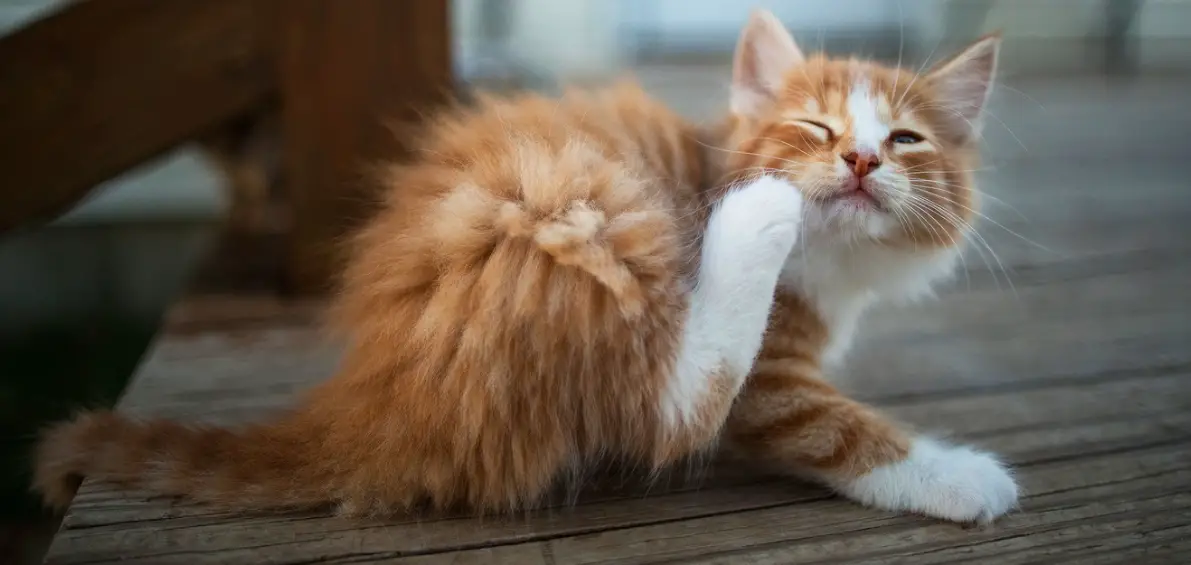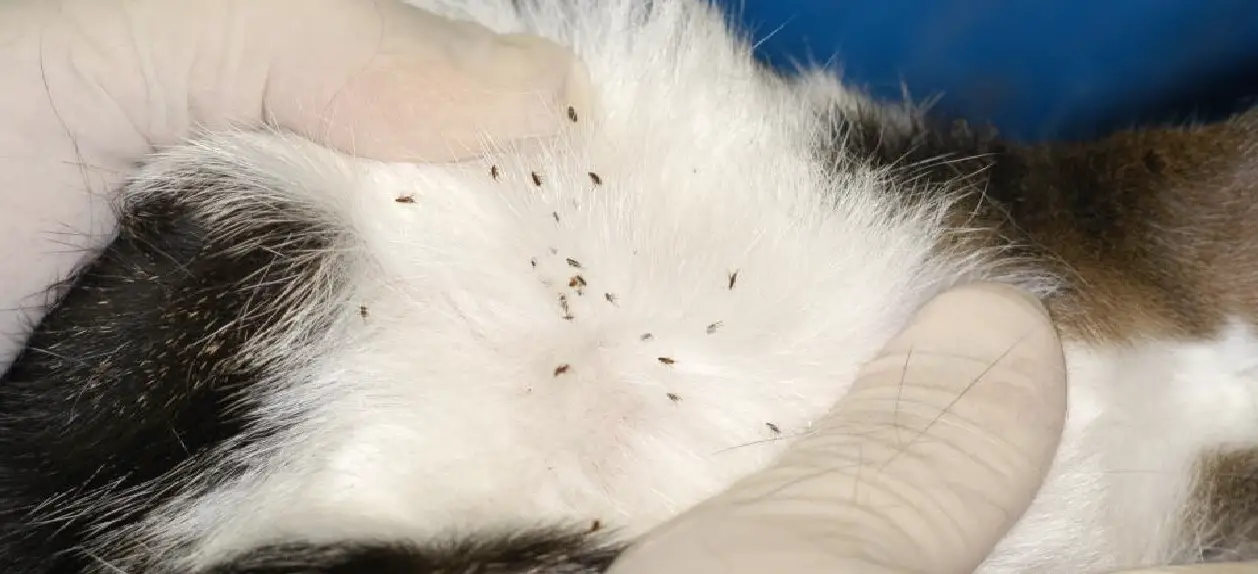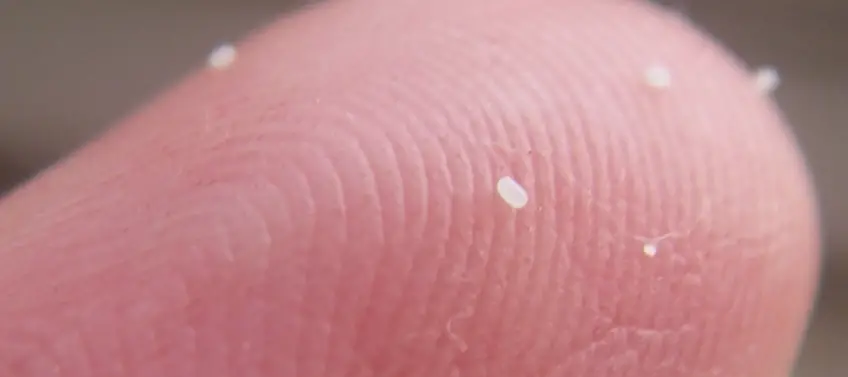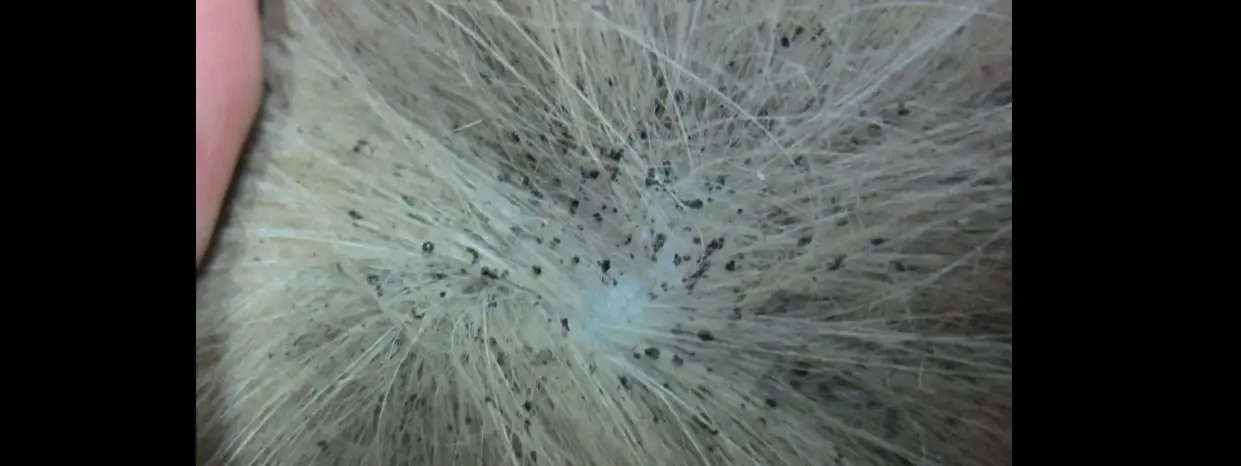- How do I know if my cat has fleas?
- What to Do If Your Cat Has Fleas
- What are the risks of having fleas in your cat?
- What are the diseases that can be caused by flea bites in cats?
- Where do fleas come from and how are they spread?
- How can you prevent a flea infestation?
- How to get rid of fleas naturally?
- When do fleas die?
- What is the flea season?
- Final Thoughts
- Frequently Asked Questions about Cat Fleas
Fleas can be fatal to kittens, older cats, or those already suffering from a disease. Severe flea infection can cause anemia in cats as well as other allergies, infections, and diseases that can be fatal to even a healthy cat if left untreated.
How do I know if my cat has fleas?
When your cat gets fleas, you will notice that he or she:
- Energic and unusual scratching.
- He grooms himself too much with his tongue.
- Hair loss
- Itchy skin or small red spots when a cat is sensitive to fleas and flea bites.
- Runny eyes or nose.
- Lethargy
- Pale gums (probable Anaemia).
You may notice one or more of these symptoms or all of them together when your cat is sensitive or allergic to fleas.

What do fleas and flea eggs look like?
Adult or fully grown fleas (in the first image) are black and visible to the naked eye, the newborn fleas (image 2) are white and are almost a millimeter long; they become yellow with a brownish back shortly after, while the larvae and the eggs (image 3) are difficult to detect in a white cat because they are also white, only 0.5 mm long, and sometimes even translucent.

You can put a sheet on the floor, preferably outside the house, and brush your cat with a fine brush to get them off and find out exactly if your cat has fleas or not.


You may also notice some tiny black flakes (image 4 ) in your cat’s fur, it’s a flea dirt (their excrement).

What to Do If Your Cat Has Fleas
If you suspect your cat has a flea infection, start by using a flea comb to remove as many fleas as possible, give your cat a bath with mild soap, and then take him directly to the veterinarian.
You can treat your cat against fleas yourself, and if you take your cat to the vet, he may give your cat a Topical treatment like FRONTLINE or an oral flea treatment like Comfortis to eliminate the adult fleas and prevent them from laying eggs and breeding.
PS/ this kind of topical or oral flea treatment is very effective but can cause some side effects in your cat, that’s why you should ask the advice of a veterinarian and read the product label before use.
And to prevent fleas from coming back to your cat, you should change your cat’s litter, clean the bedding and toys and use vinegar-based flea spray after the treatment, which will act as a repellent, especially when your cat leaves the house.
Don’t forget to vacuum frequently to remove the fleas and their eggs from your carpets ( you can also use finely grounded salt on your carpets by sprinkling it all over them to kill the fleas and their eggs), don’t leave the vacuum canister inside the house, it may contain fleas and their eggs.
To get rid of fleas in your home, you must use an insecticide (Permethrin) to kill the adult fleas, and to get rid of their eggs, another product will be necessary, you can use Methropene or Pyriproxyfen.
Ask your veterinarian for advice
And if you notice that the symptoms I mentioned above are present in your cat, and if you suspect that your cat has a flea disease, you should treat it immediately with one of the natural and homemade flea treatments below, and then take it to a veterinarian because only he will prescribe the right medicine for your cat according to its age, weight, etc.
The vet will help you again to give you the ideal shampoo or antiseptic for your cat.
What are the risks of having fleas in your cat?
Having fleas can make your cat sick: by living on your pet, these parasites put your cat at risk for
1- An allergic reaction like Dermatitis: Allergy to flea bites
Cats may suffer from many types of allergies, and some of them are allergic to flea bites. In this case, your cat will scratch too much, and chew to the point that it will pull out hair and cause skin lesions.
These lesions will induce bleeding and this will cause an infection with other microbes.
2- Intoxication
Swallowing fleas while grooming, for example, can cause intoxication, the most common being called tapeworm. It is not the flea itself that will cause this poisoning, but the worms carried by the flea that your cat could swallow.
3- Bacterial infection
Fleas can also carry bacteria that are harmful to cats. Its severity will depend on the bacteria causing the illness in the cat. The symptoms are loss of appetite, great fatigue, and fever.
Cats with excessive scratching may trigger bleeding, and then the wound will become an open door to microbes and bacteria that can worsen your cats’ situation.
What are the diseases that can be caused by flea bites in cats?
Cats can get many diseases, but some of them are usually directly due to or worsened when a cat is infected by fleas and is not treated in time, here are the most common ones:
1- Fleas can lead to Anemia
Anemia may be a complication of flea bite disease. It can occur when heavy bleeding is not controlled by the veterinarian. You may notice that your cat is anemic if it has a lack of appetite and does not move around (becomes lazy), due to weakness.
2- Bartonellosis: or cat scratch disease
Once fleas have caused your cat to itch and bleed, the blood is a gateway to outside microbes, thus a gateway to infections.
One of the most common infections is cat scratch disease, which is caused by a bacterium called Bartonella, which is why the disease is called Bartonellosis.
Symptoms of Bartonellosis in cats:
- Difficulty swallowing due to sore throat
- Intense fatigue
- Lack of appetite
- Joint pain: try to press on his paws at the joints. If he reacts, it means that his joints are hurting.
3- Tapeworms in cats
This is another complication caused by fleas. It is an intoxication and not an infection. It occurs when the cat swallows fleas that reside on its skin while licking itself. These are intestinal worms.
Be careful! When cleaning your cat, put on gloves, and wash your hands right after with disinfectants, because this disease can be transmitted to humans.
Symptoms:
- Significant weight loss while eating as usual,
- Stools with worm segments or tapeworm ring full of eggs, which look like small grains of rice.
- White, crawling particles under the cat’s tail, around the anus.
- Unwanted licking of the anal area,
- Irritation of the anus, the area becomes red
- Weakening of the general condition,
- Delayed growth in the kitten.
Don’t worry, this disease is not fatal, there are laxative treatments against tapeworms in cats, you just have to react quickly.
Can fleas cause asthma in your cat?
Fleas can cause your cat to have difficulty breathing or “dyspnea”, but not severe asthma.
Your cat is having an asthma attack when :
- She/he appears to be breathing with his mouth open.
- The mucous membranes, especially on the tongue, turn blue, indicating an inadequate oxygen supply.
Can a cat allergic to flea bites die?
Flea bite allergy in cats is not fatal, but it may become chronic (lifelong) and even embarrassing. As soon as your cat is infected, with proper care, it will disappear on its own. The treatment consists in eradicating the fleas.
There are different products that can be used on the cat during this treatment, in the form of spot-on or collars. To be effective, you must treat your cat over the long term: don’t stop once the dermatitis is gone or it will come back right away!
How to care for a cat with flea bite allergies
It is necessary to treat your other pets, which can be carriers of fleas, and also to treat the whole environment. To do this, the first thing to do is to wash all your textiles, such as sheets, carpets, and curtains, and vacuum your chairs and sofas to remove as many fleas as possible mechanically.
Then, many products are possible to eliminate fleas from your home, in spray or in a diffuser, in order to reach the eggs and larvae spread everywhere in your environment.
Where do fleas come from and how are they spread?
Fleas, even during cold temperatures, are very small microscopic insects called parasites that live on your cat’s body, feeding on its blood and laying eggs in its fur.
Their spread occurs when a single flea can lay up to 2,000 eggs on your cat in its lifetime (50 eggs/day), and its entire life cycle – from egg to adult flea – can take place in just a few days.
How can you prevent a flea infestation?
- Wash your cat’s litter box at a very high temperature (above 95°) every month.
- Vacuum all areas where your cat likes to lounge – including carpets, rugs, upholstery, and even your car.
- Change your bedding and spray a household flea spray in areas where your cat likes to sleep.
- A cat allergic to fleas should be bathed with a special antiseptic shampoo.
- Do a thorough cleaning of your home at the beginning of each season (every 3 months).
- Using specialized anti-flea collars works quickly, but it’s a matter of knowing which ones to buy and how to use them.
How to get rid of fleas naturally?
1- Clothes
The solution is freezing them. Those clothes that cannot be washed at temperatures above 40° can be frozen.
They are placed in plastic bags, then in the freezer at -18° for at least 48 hours. This way, the fleas, and their eggs will be destroyed.
2- At home
- Vacuum everywhere. Floors, rugs, carpets, sofas, and chairs… vacuum as much as possible.
- Wash everything that can be washed. Think especially of blankets, cushions, plaids… everywhere your pet sleeps.
- Do the big cleaning every 3 months.
3- Your cat’s surroundings and environment
Keep your cat away from other stray cats or cats that may be infected with fleas.
Administer a flea control product to your cat every four weeks.
It’s best to buy your product from a veterinarian, as you’ll benefit from their advice on how to administer a dose appropriate for your cat’s weight, size, and age
Keep your home clean and remember to regularly machine clean your cat’s bed. Regularly monitor his coat and if you notice the presence of new parasites, act immediately by applying the right gestures.
White vinegar against fleas
White vinegar has natural properties that allow it to scare away and kill fleas. To make this little remedy, start by diluting 250 ml of vinegar in the same amount of water.
You can also add a teaspoon of white vinegar to your cat’s shampoo bottle and use it with each bath. If you don’t like the smell of white vinegar, start by massaging your cat with white vinegar first, then showering him with his flea shampoo.
When do fleas die?
The life span of fleas is 6 months. But fleas can die before 6 months in case of freezing temperatures. because it dies at the freezing temperature from 0 to -18 and more.
But this does not mean that during winter there are no fleas. You can find fleas on the hair of your pets because they are under the shelter which must be a little warm especially if you turn on the heaters. It’s also hard for fleas to tolerate temperatures above 40°.
What is the flea season?
The flea season is usually from late spring to late fall, during this time of year flea bites can spread quite quickly. However, they are also present throughout the rest of the year but at a lower risk.
How can a washing machine kill fleas?
The washing machine can only kill a small percentage of fleas.
The washing machine has wash temperatures that are tolerated by fleas. So you need to add bleach next to the soap to wash your clothes with that will help get rid of more fleas than soap alone.
The washing machine which has a washing temperature of 60° can help you to get rid of fleas on the clothes but still, the freezing temperature can kill the fleas with effectiveness.
Baking soda to kill fleas
Baking soda can get rid of some fleas but not all of them. Just sprinkle it in your pet’s fur and massage it well so that the bicarbonate penetrates everywhere.
Leave it on for 10 minutes and then brush off the excess powder.
Final Thoughts
Finally, fleas will not usually cause death to a healthy cat, unless there is negligence or lack of good veterinary treatment, fleas may cause certain complications to your cat, and it is these complications that can be dangerous or fatal.
Remember that even though your cat stays home all the time, it is still susceptible to fleas because fleas and flea eggs can still make their way into your cat’s everyday environment by hitching a ride on other pets or humans.
It is important to take care of your cat affected by fleas by providing a clean environment and preventing the spread of these parasites.
Frequently Asked Questions about Cat Fleas
Do cats need flea prevention?
Yes, cats need a monthly tick and flea preventive, especially in the spring, but indoor cats are also affected by these preventive measures, so your veterinarian will give you more tips on how to reduce your cat’s chances of getting fleas.
Revolution Plus Topical Solution for Cats is a good treatment for eliminating probable fleas from your cat or its surroundings and preventing it from getting them if it ventures outside.
But, can cats get flea shots? PROGRAM 6 Month Injectable for Cats is another way to immunize your cat against fleas
What if my cat has licked flea treatment?
If your cat licks its flea treatment and shows signs of poisoning such as seizures, vomiting, and diarrhea, you should take it to your veterinarian immediately. If your cat shows no signs of poisoning within 8 hours, you have nothing to worry about.
Everything will depend on the product used, I advise you to read the instructions and take precautions before using these flea treatments with your cat and take the necessary measures to avoid it licking this kind of product.
Why does my cat keep getting fleas?
If your cat continues to get fleas despite the treatment, it’s probably due to one of these causes:
He gets them from your other pet
He goes outside without you noticing
His bedding or toys are infested with fleas
The treatment you used did not work on your cat, so you need to treat him again and disinfect his surroundings.
Will cat fleas die without a host?
No. Fleas will die after one to two weeks without a host, but it is best to treat your cat’s environment and vacuum as many fleas, larvae, and eggs as possible to get rid of the parasite completely.
Will cat fleas live in my bed and furniture?
Yes, fleas can live in your bed, they love warm places and if you notice small black spots (flea dirt) on your bed and you wake up with small red spots on your body, know that your bed is infected and you must absolutely get rid of it or eliminate the fleas and their eggs.
Can you touch a cat with fleas?
Yes, you can pet your cat even if it has fleas, because fleas will stay on your cat rather than jumping on you, and they love to hide in the fur, but you’d better treat your cat for fleas because if they jump on you and bite you, they can cause health problems and skin irritations.
Can cats have fleas without seeing them?
Your cat can have fleas without you seeing them, especially if it is black and has long fur. Excessive scratching can be a sign that your cat has fleas. You can also brush your cat over a sheet and check for fleas, larvae, their eggs, or excrement in the hair.
Can dog fleas live on cats?
Yes, dog fleas can jump and live on cats and any other host. There are no dog fleas or cat fleas, just fleas, which means that fleas can change hosts and jump from your dog or another cat to infect your other cat.
Where are fleas most commonly found on cats?
When a cat is infected with fleas, you can find them all over its body, especially in places where the cat’s skin is thin and the fur is long.
So look for them on the back, belly, and neck. Flea larvae and eggs are usually just a millimeter away from the cat’s skin.
Can cats get fleas from grass?
Yes, cats can get fleas from the grass because these fleas can stay alive for up to two weeks if they fall off another cat, dog, or animal.
They will jump on your cat as soon as it lies down on the grass or just walk past them, which is why it is important to prevent your cat from going outside or to disinfect your backyard if you suspect that it is infested with fleas and ticks.
Can one cat have fleas and not the other?
Yes, one cat can have fleas and the other can’t, but not for long. Fleas can jump very high and very far (up to 100 times their size) so they will quickly infest your other cat.
When your cat scratches, it can drop fleas, their larvae, or eggs (fleas can lay 50 eggs a day), which can quickly move onto your other cat or dog if it lies down in the same spot or just passes by since they can survive up to 2 weeks without a host.
Can cats get fleas in the winter?
Yes, cats can get fleas in the winter as these fleas can survive up to 2 weeks or more in the cold (30°F to 40°F).
You should therefore continue to apply flea prevention treatments to your cat every month even during the winter.


